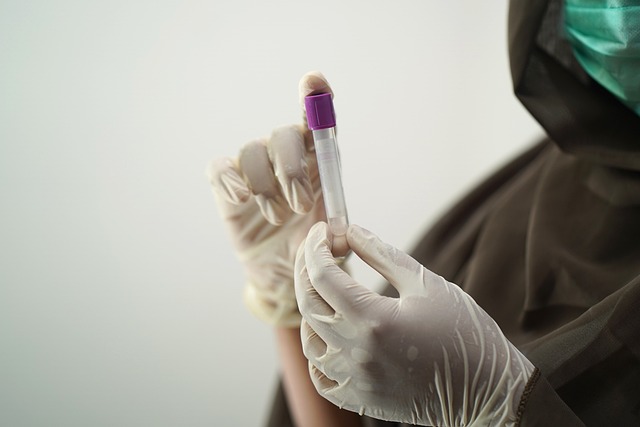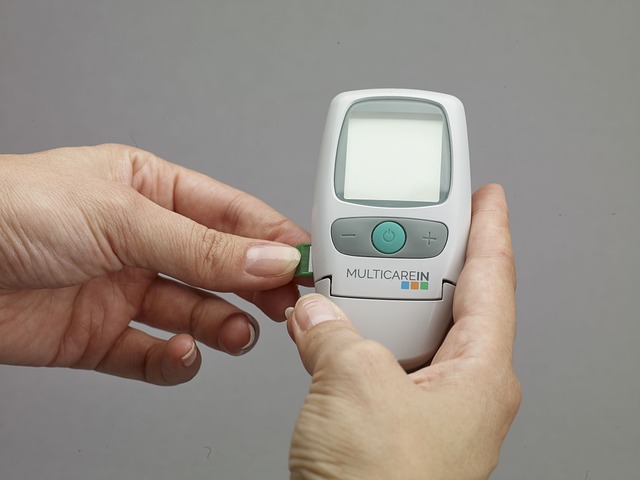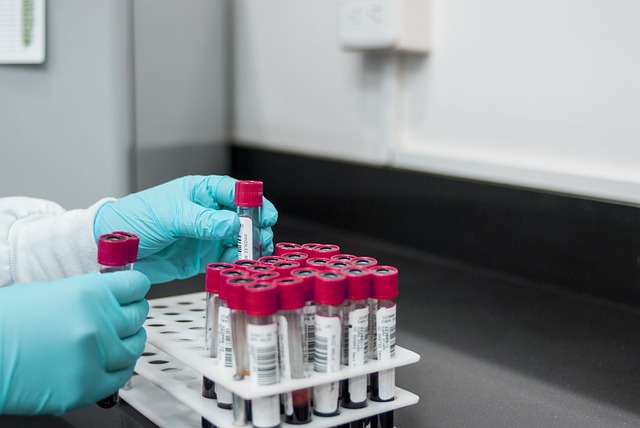The UK Standard Thyroid Blood Test is a comprehensive diagnostic tool that measures levels of Vitamin B12, TSH, T3, and T4, offering crucial insights into thyroid function and B12 status. It plays a vital role in identifying and monitoring both thyroid disorders, such as hypothyroidism and hyperthyroidism, and B12 deficiencies, which can affect DNA synthesis, red blood cell production, and nervous system function. B12 levels are assessed in picograms per milliliter (pg/mL), with the UK setting specific reference ranges based on individual risk factors and age. A diagnosis of B12 deficiency is considered if levels fall below these ranges, and early intervention is key to preventing associated health risks like anemia and neurological problems. The test's reliability and consistency make it indispensable for healthcare professionals to accurately diagnose and manage these conditions, tailor treatment plans, and improve patient outcomes. Regular follow-up tests are essential post-treatment to ensure that B12 levels remain within a healthy range. This approach underscores the importance of the UK Standard Thyroid Blood Test in maintaining overall health and well-being, particularly for those at higher risk of B12 deficiency.
Vitamin B12 plays a pivotal role in maintaining health, with deficiencies linked to anemia, neurological issues, and cognitive decline. Accurate diagnosis hinges on reliable testing, and blood tests emerge as a critical tool in this regard. This article demystifies the process of Vitamin B12 assessment through blood tests, delving into the UK Standard Thyroid Blood Test’s relevance and guiding you through the steps to interpret and manage results effectively. Understanding these aspects is key for healthcare professionals and individuals alike to navigate B12 deficiency successfully.
- Deciphering Vitamin B12 Levels: The Role of Blood Tests in Diagnosis
- Understanding the UK Standard Thyroid Blood Test and its Relation to B12 Deficiency
- Navigating B12 Deficiency: Interpretation and Management Post-Blood Test Results
Deciphering Vitamin B12 Levels: The Role of Blood Tests in Diagnosis

Vitamin B12 plays a pivotal role in maintaining optimal health, as it is integral to the production of DNA and red blood cells, as well as the proper functioning of the nervous system. Deficiencies in this vital nutrient can lead to anemia, neurological issues, and other health complications. Given its importance, it’s imperative for individuals to understand their B12 levels through reliable diagnostic measures. In the UK, one of the most trusted methods for assessing Vitamin B12 status is the UK Standard Thyroid Blood Test, which includes measurements of B12 alongside other key parameters. This comprehensive test allows healthcare professionals to decipher whether an individual’s B12 levels are within the normal range or if there is a deficiency that requires attention. The blood test measures the amount of vitamin B12 in picograms per milliliter (pg/mL) and can be indicative of both dietary intake and absorption capabilities. It is a non-invasive procedure, providing a clear picture of an individual’s B12 stores, which is crucial for early diagnosis and intervention. Additionally, the UK Standard Thyroid Blood Test ensures consistency and reliability in results, making it a go-to tool for doctors to monitor B12 levels over time and tailor treatment plans accordingly. This test is not only pivotal for individuals exhibiting symptoms suggestive of B12 deficiency, such as fatigue, weakness, or memory loss, but also for those at higher risk due to age, dietary restrictions, or certain medical conditions like pernicious anemia. By accurately determining Vitamin B12 levels, healthcare providers can effectively manage and treat deficiencies, thereby improving patient outcomes and quality of life.
Understanding the UK Standard Thyroid Blood Test and its Relation to B12 Deficiency

The UK Standard Thyroid Blood Test is a critical diagnostic tool that assesses the function of the thyroid gland by measuring levels of thyroid-stimulating hormone (TSH), triiodothyronine (T3), and thyroxine (T4). While primarily used to screen for thyroid disorders such as hypothyroidism or hyperthyroidism, this test can also provide indirect insights into the status of vitamin B12 within the body. Vitamin B12, an essential nutrient, is pivotal for DNA synthesis and red blood cell formation. A deficiency in B12 can lead to megaloblastic anemia and neurological issues, which may mimic or coexist with thyroid dysfunction.
In the context of the UK Standard Thyroid Blood Test, it is important to understand that while TSH is the cornerstone for diagnosing thyroid disorders, other measurements can be informative regarding B12 status. Elevated TSH levels typically indicate an underactive thyroid, but if B12 deficiency is also present, this can further exacerbate symptoms such as fatigue and weakness. Conversely, in cases of thyrotoxicosis, where T4 and T3 levels are high, a concomitant B12 deficiency might not be immediately apparent through TSH alone. Therefore, if thyroid function tests are abnormal or if clinical symptoms suggestive of B12 deficiency are present, additional blood tests specifically measuring serum vitamin B12 levels should be conducted to confirm the diagnosis and guide treatment. This comprehensive approach ensures a more accurate diagnosis and effective management of both thyroid disorders and B12 deficiency.
Navigating B12 Deficiency: Interpretation and Management Post-Blood Test Results

navigating B12 deficiency requires a clear understanding of the results obtained from a blood test, such as the UK Standard Thyroid Blood Test. When interpreting Vitamin B12 levels post-testing, it’s crucial to reference the reference ranges provided by the laboratory conducting the analysis. In the UK, these ranges are typically based on the lower limit of normality being 200 picograms per millilitre (pg/mL) for active individuals and 250 pg/mL for those with a higher risk of B12 deficiency or who are older in age. A level below this indicates a potential B12 deficiency, which can lead to anemia and neurological issues if left unaddressed.
Upon receiving low B12 levels, management involves a multifaceted approach tailored to the individual’s specific health profile. The first step is often dietary modification, encouraging the inclusion of foods rich in B12 such as meat, fish, dairy products, and fortified alternatives. For those with confirmed deficiency, B12 supplementation is typically recommended. The dosage and form (oral, sublingual, or injectable) depend on the severity of the deficiency, absorption capacity, and any underlying health conditions. Regular monitoring of B12 levels post-supplementation is essential to ensure that levels are restored to a healthy range and maintained. This ongoing management plan, in conjunction with the UK Standard Thyroid Blood Test, plays a pivotal role in diagnosing and treating B12 deficiency effectively.
In concluding our discussion on vitamin B12 deficiency, it is clear that blood testing plays a pivotal role in its diagnosis and management. The UK Standard Thyroid Blood Test serves as a critical tool for healthcare providers to assess B12 levels accurately. Understanding the interplay between these tests and B12 deficiency enables timely intervention and effective treatment plans, thereby supporting overall health and wellbeing. For individuals concerned about their B12 status, consulting with a medical professional after blood test results are obtained is essential for tailored advice and appropriate supplementation or lifestyle adjustments if necessary. Through informed testing and careful interpretation, we can better address the prevalence of B12 deficiency, ensuring long-term health benefits for those at risk.
